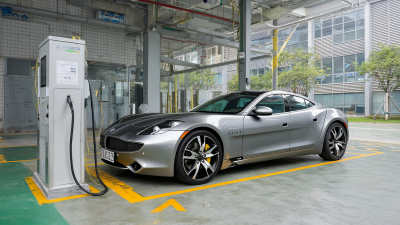
Wall Mounting EV Charge Station
5 Compelling Reasons Why Investing in AC EV Chargers is Crucial for Sustainable Growth
As the global shift towards sustainability accelerates, the importance of investing in infrastructure that supports eco-friendly technologies cannot be overstated. One such crucial investment is the AC EV charger, a vital component in the widespread adoption of electric vehicles (EVs). These chargers are not only essential for enhancing the convenience of EV ownership but also play a pivotal role in reducing greenhouse gas emissions and promoting cleaner air in our communities. With government incentives and consumer demand for green alternatives on the rise, businesses and municipalities that invest in AC EV charging stations position themselves at the forefront of this transformation, paving the way for sustainable growth.

In this blog, we will explore five compelling reasons why investing in AC EV chargers is not just beneficial but necessary for fostering a greener future and unlocking new opportunities.
The Rise of Electric Vehicles: A Market Worth Over $800 Billion by 2027
The electric vehicle market is on an unstoppable trajectory, with its valuation soaring from USD 500.48 billion in 2023 to a projected USD 800 billion by 2027. This remarkable growth reflects a global shift towards sustainable transportation solutions, underpinned by increasing consumer awareness and government incentives. As electric vehicles gain traction, the demand for supporting infrastructure, particularly for AC EV chargers, becomes paramount.

Investing in AC EV chargers is crucial not only for accommodating the growing number of electric vehicles but also for fostering sustainable growth within the automotive industry. As the market expands, companies that prioritize the development of charging networks will position themselves as leaders in this eco-friendly revolution. The convergence of innovative technologies, coupled with a supportive regulatory environment, creates a fertile ground for investment in electric vehicle infrastructure, paving the way for a cleaner and more efficient future.
The Environmental Impact: Cutting Carbon Emissions by Up to 70% with EV Adoption
The electrification of transport is heralded as a vital strategy for reducing carbon emissions, with electric vehicles (EVs) standing at the forefront of this transformation. In 2022, New Zealand achieved an impressive 87.1% share of renewable sources in electricity generation, demonstrating the potential of a robust clean energy infrastructure to support EV adoption. Studies indicate that the integration of EVs can cut carbon emissions significantly; one analysis suggests that widespread electrification could lead to a reduction of CO2 by up to 70%, particularly when coupled with renewable energy sources.

Furthermore, research in urban areas like the Beijing-Tianjin-Hebei region has underscored the opportunities presented by fleet electrification, estimating a reduction of PM2.5 by approximately 0.8 µg/m³ due to EV implementation. This data highlights not only the direct benefits of EVs in decreasing greenhouse gas emissions but also their role in improving urban air quality. As cities strive to mitigate pollution and enhance sustainability, investing in EV charging infrastructure becomes crucial, facilitating the transition towards a greener future. This alignment of EV adoption with renewable energy resources stands to create significant environmental benefits, transforming transportation into a cleaner, more sustainable endeavor for all.
Government Incentives and Grants: Up to $7,500 Tax Credit for EV Buyers
As electric vehicles (EVs) gain popularity, governments worldwide are stepping up to encourage their adoption through generous incentives and grants. One of the most attractive offerings currently available is the tax credit of up to $7,500 for EV buyers. This substantial financial benefit not only reduces the initial purchase cost but also makes the transition to greener transportation more accessible for many consumers. By investing in AC EV chargers at home or in public spaces, businesses can enhance the charging infrastructure, making electric cars a more convenient option for potential drivers.
Moreover, these incentives are a powerful motivator for consumers considering their options. When they recognize that purchasing an EV could lead to significant savings through tax credits, the barrier to entry diminishes. This creates a ripple effect in the market, encouraging even more investments in electric vehicle infrastructure. By supporting the installation of AC EV chargers, businesses not only align themselves with sustainable growth but also position themselves as leaders in the green economy, tapping into the growing demand for eco-friendly transportation solutions.
Infrastructure Demand: Projected Growth to 1.2 Million Charging Stations by 2030
As electric vehicle (EV) adoption accelerates, the demand for charging infrastructure is set to surge dramatically. According to recent studies, the number of charging stations in the United States alone is projected to reach 1.2 million by 2030—an increase from approximately 100,000 in 2022. This growth is driven by initiatives from both private and public sectors aiming to promote sustainable transportation. The International Energy Agency (IEA) estimates that by 2030, global EV sales may reach 30% of all vehicle sales, emphasizing the urgent need for robust charging networks to support this transition.
Investing in AC EV chargers is not just a sustainable choice but a strategic one. A report from Bloomberg New Energy Finance highlights that the charging market could see investments of over $200 billion by the end of this decade. As more consumers shift towards electric vehicles, there will be a high demand for convenient and accessible charging solutions. Incorporating smart technology into charging infrastructure can enhance user experience, optimize energy consumption, and align with renewable energy sources. This convergence of demand and technological advancement presents a unique opportunity for stakeholders to contribute to a greener future while benefiting from a rapidly evolving market.
Business Opportunities: An Estimated $22 Billion Energy Revenue from EV Charging by 2025
As electric vehicles (EVs) continue to gain momentum, the infrastructure to support their growth becomes increasingly vital. Business opportunities surrounding EV charging are expected to soar, with projections estimating a staggering $22 billion in energy revenue by 2025. This booming market positions companies to not only contribute to sustainable growth but also capitalize on a rapidly expanding consumer demand for charging solutions.
Investing in AC EV chargers is a strategic move that can significantly enhance a business's profile in this evolving landscape. By integrating charging stations into their operations, businesses can attract eco-conscious customers, offer new services, and create a competitive edge in their industry. Furthermore, as more cities implement stringent emissions regulations, companies that prioritize EV infrastructure will likely see increased patronage, establishing themselves as leaders in sustainability and innovation. This trend underscores the importance of proactive investment in AC EV chargers, not just for environmental commitment but for robust financial growth in the near future.
Related Posts
-

2025 Trends Revealed 7 Key Innovations in Best Ev Charger Technology
-

7 Tips for Choosing the Best AC Ev Charging Cable for Your Electric Vehicle
-

7 Compelling Reasons to Choose Home Wall Ev Charge Station for Your Business
-

Unleashing Innovation in Portable EV Chargers from China Quality Assurance for Global Buyers
-

Innovative Approaches for Efficient Home Wall Ev Charge Station Installation
-

The Complete Guide to Choosing the Best V2L Adapter for Your Needs

